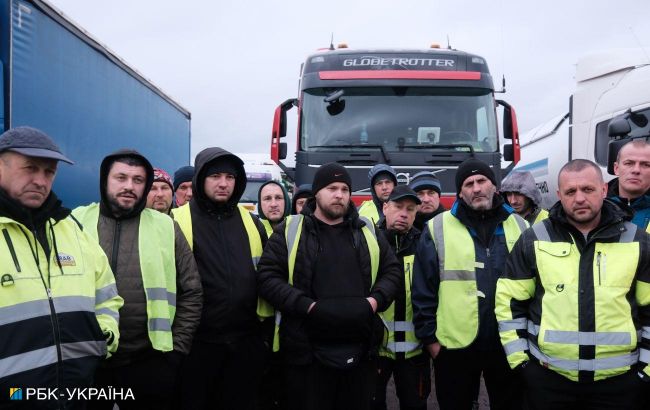Ukraine and Poland agree on partial border unlocking: What changes
 Photo: Ukraine and Poland agree on partial border unlocking (Vitalii Nosach, RBC-Ukraine)
Photo: Ukraine and Poland agree on partial border unlocking (Vitalii Nosach, RBC-Ukraine)
Ukraine and Poland have agreed on measures for the partial unlocking of the border. The issue of canceling or changing the transport visa-free was not discussed, according to the press service of Ministry for Communities, Territories and Infrastructure Development of Ukraine.
A meeting took place in Warsaw between the Deputy Minister for Communities, Territories Development and Infrastructure of Ukraine, Serhiy Derkach, and the Deputy Minister of Infrastructure of Poland, Rafal Weber, chaired by Jadwiga Emilewicz, the government commissioner for Polish-Ukrainian cooperation in the field of development, with the participation of the Ministry of Finance and the Ministry of Internal Affairs of Poland.
During the meeting, the parties agreed on a series of measures, including:
-
Opening the crossing point Uhryniv - Dolhobychuv for the passage of empty trucks to increase the border's capacity and reduce the load on other crossing points.
-
Creating separate lanes for empty vehicles in the eQueue system at the crossing points Yahodyn - Dorohusk and Krakivets - Korczowa. Physical lanes for empty transport exist at these crossing points directly at the crossing point on both the Ukrainian and Polish sides.
-
Launching a pilot project for registration in the eQueue directly before crossing the border at the crossing point Nyzhankovychi - Malhovitse for a period of one month.
The issue of canceling or changing the transport visa-free was not discussed and was not on the agenda. Polish protesters insist on the operation of Ugriniv - Dolhobychuv and Nyzhankovychi - Malhovitse only for vehicles registered in the EU. This position is unacceptable for Ukraine and the EU as it discriminates against other countries.
The last was confirmed during the meeting of the Coordination Platform Ukraine-Poland-EU with the participation of the leadership of the Directorate-General for Mobility and Transport of the European Commission (DG MOVE) on November 30, the press service adds.
Meanwhile, the Ministry of Infrastructure, in collaboration with DG MOVE, is working on solutions to regulate the situation with queues at the border and reduce tension in the issue of road transport.
Key positions include improving the capacity of existing crossing points, especially the efficiency of phytosanitary and other types of control, to comply with memorandums regulating the number of trucks passing through the border. It also involves developing an action plan for the development of Ukrainian-Polish crossing points, the press service notes.
Blocking checkpoints on the border with Ukraine
Since November 6, Polish carriers have started a strike and blocked several checkpoints, including:
-
Yahodyn - Dorohusk
-
Krakivets - Korczowa
-
Rava-Ruska - Hrebenne
-
Shehyni - Medyka
Carriers have put forward demands, including:
-
Restoring permit relations with Ukraine.
-
Strengthening transport rules.
-
Prohibiting the registration of companies in Poland if their finances and accounting are outside the EU.
-
Access to the Ukrainian Shlyakh system.
-
Allocating separate queues for EU cars in the eQueue system.
-
Allocating separate queues for empty vehicles.
As Derkach reported, the Polish government cannot unilaterally influence the agreement between Ukraine and the European Union on the liberalization of freight transport, despite being one of the protesters' demands.

